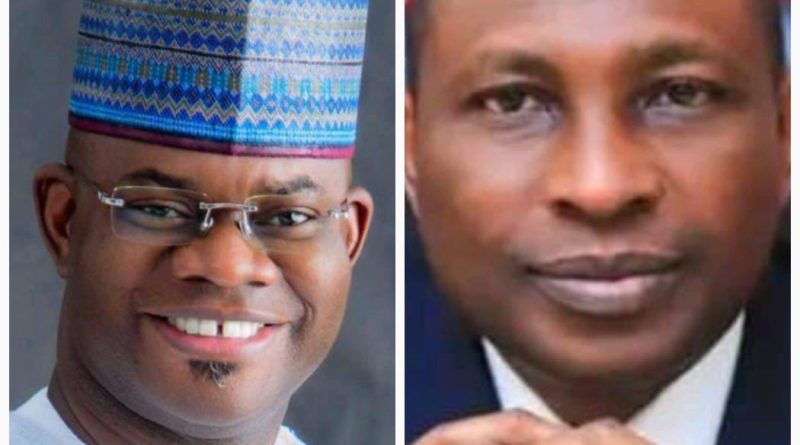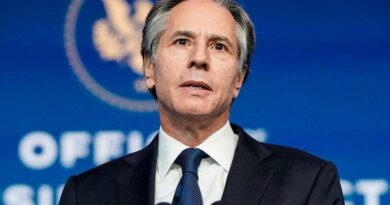EFCC Vs Yahaya Bello: What The Story Must Not Be On Or After June 13
By Lere Olayinka
On May 10, 2024, a Federal High Court sitting in Abuja, adjourned till June 13, 2024, for the arraignment of the immediate past Governor of Kogi State, Alhaji Yahaya Bello, with the alleged N80.2bn fraud charges brought against him by the Economic and Financial Crimes Commission (EFCC).
Count one of the charges reads: That you, Yahaya Adoza Bello, Ali Bello, Dauda Suliman, and Abdulsalam Hudu (Still at large), sometime, in February, 2016, in Abuja within the jurisdiction of this Honourable Court, conspired amongst yourselves to convert the total sum of N80, 246,470, 088.88( Eighty Billion, Two Hundred and Forty Six Million, Four Hundred and Seventy Thousand and Eight Nine Naira, Eighty Eight Kobo), which sum you reasonably ought to have known forms part of the proceeds of your unlawful activity to wit, criminal breach of trust and you thereby committed an offence contrary to Section 18(a) and punishable under Section 15(3) of the Money Laundering (Prohibition) Act, 2011 as amended”.
Yahaya Bello assumed office as governor of Kogi State on January 27, 2016 and left office on January 27, 2024.
Before the present charge was filed against Yahaya Bello, EFCC, had claimed, in the ‘Amended Charge’ No. FHC/ABJ/CR/550/2022: FRN V. 1. Ali Bello, Dauda Suleiman, currently pending before Justice J.K. Omotosho of the Federal High Court, Abuja Division, that he (Yahaya Bello) diverted N80 billion of state funds in September 2015, four months before he assumed office as governor of Kogi State!
Before adjourning till June 13, Justice Emeka Nwite, had rejected the application made by Yahaya Bello through his lawyer, Abdulwahab Mohammed (SAN).
Nwite held that “The application cannot be entertained unless the defendant (Yahaya Bello) is present in the court. In the absence of the defendant in court, the motion on notice filed by the complainant can only be conducted if the defendant is in court.”
Responding to comment by Bello’s counsel that he would love to obey the court order and appear in court but he was afraid of his life, the judge said; “Bello should come to court on his own not through EFCC for arraignment on the next adjourned date.
“It is just a charge. It has not been proven. Counsel, it is your duty to bring him and you prepare yourselves.”
On this premise, Mohammed assured the court that he will ensure that the former governor appears in court for his arraignment on the next adjourned date.
Of course, like the judge said, Bello only needs to come court on his own and not through the EFCC for arraignment.Issue of arrest or no arrest is already gone the moment Bello appears in court on June 13 and takes his plea.
The story must therefore not be that EFCC arrests Yahaya Bello on or after June 13. The story must also not be that EFCC invades Yahaya Bello’s house.
Rather, it should be about EFCC presenting evidence(s) of its allegations before the Court.This is because once an accused is charged to court, it presupposes that investigation has been concluded and only the court can have hold on such person.
Therefore, when Bello is arraigned on June 13, he will take his plea and if he pleads not guilty, he will apply for bail through his counsel. If his bail is granted, he will go home after fulfilling the conditions and return to court on the next adjourned date for the continuation of his trial.
In other words, Bello no longer have any business with the EFCC. He is an accused before the Court, with the EFCC as his accuser who must prove its accusations beyond reasonable doubt.
On June 13, let there be no display of any form of bravado with the arrest of Bello, under the pretext that there is another matter under investigation.
After all, like many other cases, the EFCC has been on his case for a very long period of time and all investigations ought to have been concluded.
Except may be, as usual, the EFCC will be expecting the accused to be the one to provide the evidence(s) with which he will be tried.It will also do the image of the EFCC a lot of good by focusing attention more on the prosecution of Bello with the charges already filed, including the one alleging that sometime, in February, 2016, in Abuja, he conspired with others to steal over N80 billion belonging to Kogi State.
Seeking to amend the charges will mean that EFCC, an anti-graft agency being headed by a lawyer did not know what it was doing before dragging Bello before the Court.
Most importantly, after June 13 that Bello has been arraigned in court, the onus will now be on the EFCC to prove its allegations and do so as provided by the laws.
As for me, I am hoping this will not be like that of former Governor of Ogun State, Senator Gbenga Daniel, who was charged to court for stealing N58bn in 2011, only for the EFCC, after all the media noise and public drama, to come back and reduce what he allegedly stole to N211.3 million!
Interestingly, after 11 years, the case against Senator Gbenga Daniel was dismissed by the Court and the Court even describe the prosecution as malicious.
Most importantly, the EFCC Chairman, Ola Olukoyede, should now have time to go after those he boasted in January, this year, that their cases will be reopened. Or shouldn’t what is good for Bello of Kogi also be good for Bellos of elsewhere?
Olayinka, a journalist lives with the Irunmales of Oke Agbonna in Okemesi Ekiti




